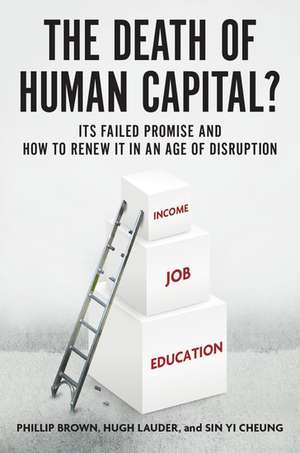The Death of Human Capital?: Its Failed Promise and How to Renew It in an Age of Disruption
Autor Phillip Brown, Hugh Lauder, Sin Yi Cheungen Limba Engleză Paperback – 4 noi 2020
| Toate formatele și edițiile | Preț | Express |
|---|---|---|
| Paperback (1) | 196.81 lei 10-16 zile | |
| Oxford University Press – 4 noi 2020 | 196.81 lei 10-16 zile | |
| Hardback (1) | 581.88 lei 31-37 zile | |
| Oxford University Press – 4 noi 2020 | 581.88 lei 31-37 zile |
Preț: 196.81 lei
Preț vechi: 215.74 lei
-9% Nou
Puncte Express: 295
Preț estimativ în valută:
37.66€ • 40.90$ • 31.64£
37.66€ • 40.90$ • 31.64£
Carte disponibilă
Livrare economică 21-27 martie
Preluare comenzi: 021 569.72.76
Specificații
ISBN-13: 9780190644314
ISBN-10: 0190644311
Pagini: 314
Ilustrații: 28 black and white figures; 3 tables
Dimensiuni: 231 x 150 x 23 mm
Greutate: 0.45 kg
Editura: Oxford University Press
Colecția OUP USA
Locul publicării:New York, United States
ISBN-10: 0190644311
Pagini: 314
Ilustrații: 28 black and white figures; 3 tables
Dimensiuni: 231 x 150 x 23 mm
Greutate: 0.45 kg
Editura: Oxford University Press
Colecția OUP USA
Locul publicării:New York, United States
Recenzii
...this new theory is appealing. Recommended. All levels.
The Death of Human Capital? challenges the conventional wisdom of human capital theory when analyzing higher education, graduate employment, and youth transition from education to work. It is not only thought-provoking, but breaks new ground for offering comparative and international perspectives in understanding global competition, new technologies, and economic inequalities in the highly globalized world." -Ka Ho Mok, Chair Professor of Comparative Policy, Lingnan University, Hong Kong
Human capital theory and the policies spawned from it have promised much, delivered little, and trapped us all in an endless cycle of chasing the next credential. Brown, Lauder, and Chueng provide a clear and compelling argument for an alternative vision of labor markets that accounts for job creation, job destruction, and job skills, providing a roadmap for coming to terms with real inequalities in opportunity and life chances." -Kevin T. Leicht, Professor of Sociology, University of Illinois Urbana-Champaign
The Death of Human Capital? challenges the conventional wisdom of human capital theory when analyzing higher education, graduate employment, and youth transition from education to work. It is not only thought-provoking, but breaks new ground for offering comparative and international perspectives in understanding global competition, new technologies, and economic inequalities in the highly globalized world." -Ka Ho Mok, Chair Professor of Comparative Policy, Lingnan University, Hong Kong
Human capital theory and the policies spawned from it have promised much, delivered little, and trapped us all in an endless cycle of chasing the next credential. Brown, Lauder, and Chueng provide a clear and compelling argument for an alternative vision of labor markets that accounts for job creation, job destruction, and job skills, providing a roadmap for coming to terms with real inequalities in opportunity and life chances." -Kevin T. Leicht, Professor of Sociology, University of Illinois Urbana-Champaign
Notă biografică
Phillip Brown is a Distinguished Research Professor in the School of Social Sciences at Cardiff University. His publications include 18 books and over 100 academic articles and reports. He has given presentations in over twenty countries. He Chaired an Independent Review for the Welsh Government examining the impact of digital innovation for the economy and the future of work in Wales, UK, and is currently leading a six-country research program examining digital transformation and the future of work, education and skills, in collaboration with the Research and Innovation Division, Institute of Adult Learning, Singapore University of Social Sciences (SUSS). He also serves on the Council of Management, National Institute for Economic and Social Research, London.Hugh Lauder is Professor of Education and Political Economy at the University of Bath. He specializes in the relationship of education to the economy and has for over 20 years worked on national skill strategies and the global economy. His current work is on the alternatives to human capital and skill bias technical change theories. Sin Yi Cheung is Professor of Sociology at the School of Social Sciences at Cardiff University. Her research addresses different forms of social inequalities in Britain and in comparative perspective. She has published on the changing inequalities in higher education, ethno-religious penalties in the labor market, lone parents on benefits, claimants' dynamics, children in care, migration and refugee integration.
